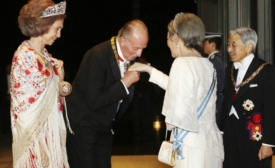diplomacy

CPD Blogger Neal Rosendorf on the recent abdication of King Juan Carlos I, Spanish soft power, democracy and more.
The outcome of India's national election — a resounding triumph for the opposition Bharatiya Janata Party — has put the United States in an awkward position. The BJP's Narendra Modi will soon be India's prime minister. In 2005, Washington revoked his U.S. visa, citing a law banning visits by foreign officials responsible for egregious violations of religious freedom.
A cherry tree by the Potomac River measures 2 meters around its trunk. Looking at the young leaves, you would never guess this tree was more than 100 years old. A nearby sign states that this is the first cherry tree that Tokyo gifted to Washington, D.C., in 1912 as a symbol of their friendship.
The likely defeat of the Congress Party in India’s 16th general election has prompted considerable debate about the impact a change of guard in Delhi will have on foreign policy. What would India’s foreign policy look like in the event of the Hindu nationalist Bharatiya Janata Party (BJP) government coming to power, either on its own or with the support of allies?
On Monday China and Iran agreed to deepen defense ties, according to Chinese state media. The announcement was made following a meeting between Chinese Defense Minister Chang Wanquan and his Iranian counterpart, Hossein Dehqan.
Chinese Premier Li Keqiang started an Africa tour on Sunday with his arrival in Ethiopia, where he will also visit the headquarters of the African Union (AU). Ethiopia is the first leg of Li's ongoing four-nation Africa tour, his first to the "Land of Hope" since he took office last year and the latest stroke of the frequent high-level diplomacy between the Asian giant and the promising continent.
At least nine Libyan soldiers were killed in the early hours of Friday morning, and dozens injured, after clashes broke out between Ansar al Sharia militants and other Islamist militants. In addition, three Libyan soldiers were killed Tuesday morning, and two others injured, after a suicide bomber blew up his car at the entrance of an army brigade headquarters in the city of Benghazi.
The US Secretary of State has warned of the risk of genocide in South Sudan if the civil war is not stopped. John Kerry made the comments during meetings in Ethiopia, where talks are under way between South Sudan's government and rebels. Kerry’s visit is part of international diplomatic efforts to defuse the crisis.







